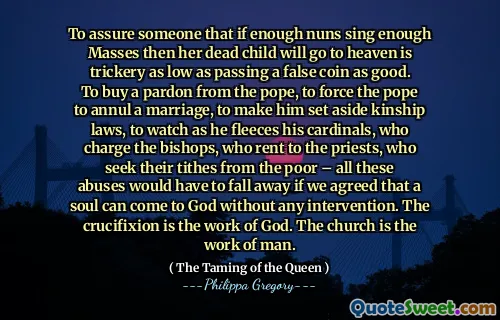
To assure someone that if enough nuns sing enough Masses then her dead child will go to heaven is trickery as low as passing a false coin as good. To buy a pardon from the pope, to force the pope to annul a marriage, to make him set aside kinship laws, to watch as he fleeces his cardinals, who charge the bishops, who rent to the priests, who seek their tithes from the poor – all these abuses would have to fall away if we agreed that a soul can come to God without any intervention. The crucifixion is the work of God. The church is the work of man.
This quote challenges the institutional practices of the Church by contrasting divine grace with human corruption. It sharply criticizes the idea that spiritual salvation can be earned or manipulated through rituals, financial transactions, or ecclesiastical power plays. The comparison of false promises about salvation to counterfeiting money highlights the exploitation inherent within religious constructs that promise spiritual benefits in exchange for obedience or wealth. It reflects a deep disillusionment with the Church’s role in mediating between people and God, presenting the institution as an imperfect, fallible human creation rather than a pure conduit of divine will. The crucifixion, representing the sacrifice made by Christ in Christian theology, is framed as an act purely originating from God, while the Church’s various schemes and structures are portrayed as human inventions, subject to the same flaws and abuses found in any institution made and run by people. This distinction urges readers to consider the possibility of a direct, unmediated relationship with the divine, emphasizing faith and grace as opposed to institutionalized power and ritual. The quote invites reflection on the nature of faith, the potential for spiritual exploitation, and the importance of distinguishing between genuine divine mystery and man-made religious authority. It serves as a potent reminder about the potential dangers when religious institutions prioritize temporal power and wealth over spiritual integrity and humility.






